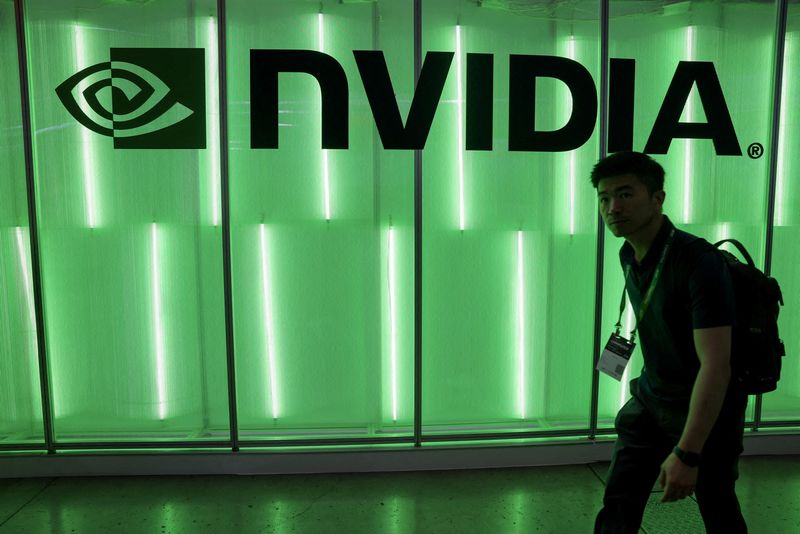(Reuters) -Nvidia's 10-for-1 stock split aimed at luring retail investors has taken effect, sparking speculation over chances of the artificial intelligence bellwether's inclusion in the blue-chip Dow index.
The split, aimed at lowering per-share value to make it more affordable for employees and investors, increases the company's outstanding shares without changing its market valuation.
"A side-effect of Nvidia (NASDAQ:NVDA)'s stock split will be to put it in the running to follow Amazon (NASDAQ:AMZN) and Apple (NASDAQ:AAPL) into the Dow, potentially pushing out fellow chip stock Intel (NASDAQ:INTC) that currently has the lowest weighting," said Ben Laidler, global markets strategist at digital brokerage eToro.
The stock dipped 0.2% on Monday, after having climbed nearly 27% since the company announced the share split and a strong forecast last month. The dominant AI chip maker also clinched $3 trillion in market value last week and surpassed Apple to become the second-most valuable firm in the world, trailing only Microsoft (NASDAQ:MSFT).
"Historically, when we see runs like this into a split, there is often a hangover effect afterwards and I'd expect some buyer exhaustion this week," Dennis Dick, market structure analyst at Triple D Trading, said on Nvidia shares.
Market analysts said stock splits tend to attract individual investors that trade in smaller lots and have lesser capital to deploy than institutional investors.
However, Goldman Sachs strategists led by David Kostin said in a note most recent stock splits have not generated a significant increase in retail trading activity, but there have been some notable exceptions such as Amazon's split in 2022 and Nvidia's 2021 split.
Moreover, "investors typically assign higher valuations to liquid stocks because of their low trading costs and flexibility in a variety of market environments", the strategists said.
Over the last several years, trading volumes have briefly increased following stock split announcements but evidenced little change during and after the splits took effect, according to Goldman's analysis of 45 Russell 1000 stock splits since 2019.

Nvidia's stock was last trading at $120 per share post-split, compared with $1,200 on Friday, making it a potential contender for the 30-member price-weighted Dow index.
An S&P Dow Jones Indices spokeswoman late in May said it does not comment or speculate on index additions or deletions.